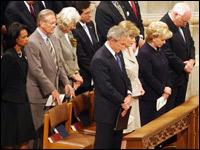Transcript
BOB GARFIELD:
Jeff Sharlet's new book is called The Family, and in it he examines evangelical politicians who belong to a group called The Fellowship or, more simply, The Family. Sharlet agrees with Christine Wicker's revised stats on evangelicals, but he thinks that evangelical Christianity works its influence on the country's most powerful politicians in less transparent ways, below the media's radar.
JEFF SHARLET:
The Family is this international network of elite Christian conservative activists concentrated in military, government and business. They really believe that if you are wealthy, if you're powerful, God's chosen you, and that's who they want to minister to.
And, as a result, they've always had a certain tension with the kind of -- the populist fundamentalist movement of radio religion, mass rallies and televangelists. They tend to look upon the James Dobsons and the Jerry Falwells as kind of tacky, as outsider movements, mass movements, whereas The Family sees themselves as insiders, and, I think, have a much more sophisticated understanding of how political influence can work and, over the long term, I think, a much more sophisticated understanding of how to work the media.
BOB GARFIELD:
Now, bear with me. I'm about to read you a list. The Masons, the Illuminati, the Trilateral Commission, the CIA, Skull and Bones, the Jews. The idea of shadowy networks wielding secret power has fascinated partisans and paranoiacs [LAUGHS] across the political spectrum, forever.
JEFF SHARLET:
Mm-hmm. [AFFIRMATIVE]
BOB GARFIELD:
But you were actually able to infiltrate The Family because it's hidden in plain sight?
JEFF SHARLET:
I wasn't so much able to infiltrate as I kind of walked in through the front door. Several years ago, because I write about religion, a friend asked me to talk to her brother whom she was afraid had joined a cult. And that was my introduction. I moved on from there to Wheaton College, an evangelical college west of Chicago, where The Family had dumped 600 boxes of documents.
So we don't have to get involved in any kind of conspiratorial thinking. We can turn to this incredible documentary record, as well as the interviews I was able to with members of The Family, like Senator Sam Brownback, Representative Frank Wolf, Senator Mark Pryor.
BOB GARFIELD:
You first wrote about The Family something like four years ago in a long piece in Harper's Magazine that was just jaw dropping. And yet, it seems to me in the intervening time it hasn't gotten a lot of traction. You're just not reading about The Family elsewhere. Why do you suppose that is?
JEFF SHARLET:
The media recognizes fundamentalism and religious activism when it comes in these very stereotypical roles, whereas the elite fundamentalist tradition doesn't look like what Americans think fundamentalists are, going all the way back to 1925 when H.L. Mencken set the mold with his description of these sort of hillbilly Bible-thumpers at the Scopes Monkey Trial, more recently in The Washington Post, which dismissed fundamentalists as largely ignorant and easily led and poor rural people. That just doesn't describe the elite part of the movement.
BOB GARFIELD:
Could it be that the press, sort of as an institution, have looked at this and decided that The Family exists but it's more like just an extremely elite prayer group?
JEFF SHARLET:
The press does look at The Family's only public event every year, which is something called the National Prayer Breakfast, which is the dullest, blandest, most ecumenical event in America, and concludes that there's really nothing going on here. And they don't really ask very many questions.
But recently a sociologist named D. Michael Lindsay, Rice University, published a book from Oxford University Press. He interviews 350 top political leaders, congressmen, two former presidents, who describe themselves as evangelical, and asked them what group do they see as most influential in Washington?
One in three names The Family or The Fellowship, as it's also called, which is more than respond for any other group, more than identify James Dobson's Focus on the Family or Tony Perkins' Family Research Council. That should be a story.
BOB GARFIELD:
So why is the press so skittish about asking the questions that need to be asked? Does it have to do with being uncomfortable being perceived as treading on other people's faith?
JEFF SHARLET:
I think that's part of it. I remember a real good case study. This was when John Ashcroft took office as Attorney General and you saw a lot of profiles about Ashcroft, and a lot of them noted his weekly morning prayer breakfast. And they would just note that and stop there and not ask any further questions. Now, to me, that's not a conspiratorial question. I want to know well, what are your theological influences?
When JFK gave his famous speech, talking about his understanding of the relationship of his Catholicism to his decision making, that should have pretty much ended the questions there. He had told us how it was going to affect his decision making.
When Senator Sam Brownback, on the other hand, a current senator from Kansas, declares that his faith teaches him that he has only one constituent, and it's Jesus, and when it comes down to a tough decision he has to think about what Jesus wants, that becomes a very legitimate issue to explore. And the press needs to do a better job at exploring religious ideas.
BOB GARFIELD:
Jeff, thank you.
JEFF SHARLET:
Thanks, Bob.
BOB GARFIELD:
Jeff Sharlet is an associate research scholar at the NYU Center for Religion and Media and the author of The Family: The Secret Fundamentalism at the Heart of American Power.
